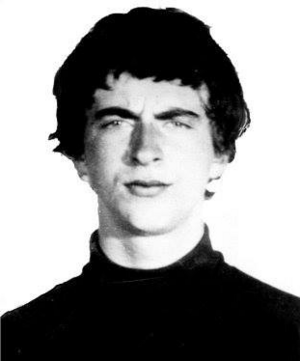Ronan Luathach: Difference between revisions
4leafclovrs (talk | contribs) mNo edit summary |
4leafclovrs (talk | contribs) mNo edit summary |
||
| Line 29: | Line 29: | ||
'''Ronan Hastings''' ({{wp|Irish language|Caerlanni Mealliagian}}: ''Ronan Luathach''; 20 July 1932 – 13 June 2002) was a [[Caerlannach|Caerlanni]] {{wp|Anarchism|anarchist}} writer and publisher, turned revolutionary who was a leading figure in the late-20th century struggle for Caerlanni independence. He served as the Ceannaire and was the President of the High Council of the Caerlanni Free State. | '''Ronan Hastings''' ({{wp|Irish language|Caerlanni Mealliagian}}: ''Ronan Luathach''; 20 July 1932 – 13 June 2002) was a [[Caerlannach|Caerlanni]] {{wp|Anarchism|anarchist}} writer and publisher, turned revolutionary who was a leading figure in the late-20th century struggle for Caerlanni independence. He served as the Ceannaire and was the President of the High Council of the Caerlanni Free State. | ||
Born in Dúnradh, Gotneska, Hastings was the youngest of five children in his family. He was born a family | Born in Dúnradh, Gotneska, Hastings was the youngest of five children in his family. He was born to a family of the Luathach tribe that moved to Dúnradh. In his early years, he became involved in revolutionary politics, deeply influenced by his experiences and the socio-political climate of the time. He actively engaged with the Caerlanni Separatist Group, where he rose to prominence. Hastings published several books promoting the idea of a free Caerlanni state and the principles of anarchism. His revolutionary activities included a notable attempt to assassinate [[Patrick XIII, Emperor of Goutian Empire|Patrick XIII]], the Emperor of the Goutian Empire, in 1965. Following this incident, he was forced into hiding in Caerlannch region before eventually fleeing to [[Fulgistan]]. He returned to Caerlannach a few years later to lead the [[Caerlanni War for Independence]]. | ||
During his leadership, Hastings established an interim government and directed a strategic offensive to achieve the independence of Caerlannach. He gained fame as a {{wp|Guerrilla warfare|guerrilla}} and {{wp|Urban warfare|urban warfare}} strategist, planning many successful attacks on Gotneskan forces with his significantly lower numbers forces. After the war concluded, he was appointed the Ceannaire of the [[Caerlanni Free State]], an interim government he established to deconstruct and form an anarchist system. He then led Caerlannach through the [[Deconstructional Period (Caerlannach)|Deconstrutional]] and [[Pacification of Caerlannach|Pacification]] periods. He passed away in June 2002, from a heart failure. | During his leadership, Hastings established an interim government and directed a strategic offensive to achieve the independence of Caerlannach. He gained fame as a {{wp|Guerrilla warfare|guerrilla}} and {{wp|Urban warfare|urban warfare}} strategist, planning many successful attacks on Gotneskan forces with his significantly lower numbers forces. After the war concluded, he was appointed the Ceannaire of the [[Caerlanni Free State]], an interim government he established to deconstruct and form an anarchist system. He then led Caerlannach through the [[Deconstructional Period (Caerlannach)|Deconstrutional]] and [[Pacification of Caerlannach|Pacification]] periods. He passed away in June 2002, from a heart failure. | ||
Revision as of 15:50, 1 November 2024
Ronan Hastings | |
|---|---|
Ronan Luathach | |
 Luathach in 1965 | |
| Ceannaire of the Caerlanni Free State | |
| Preceded by | Office established |
| Succeeded by | Office abolished |
| President of the High Council | |
| In office 2 April 1919 – 22 August 1922 | |
| Preceded by | Office established |
| Succeeded by | Office abolished |
| Personal details | |
| Born | 20 July 1932 Dúnradh, Gotneska |
| Died | 13 June 2002 (aged 69) Uaraigvik, Caerlannach |
| Political party | Caerlanni Free Party |
| Nickname | The Hotheaded Mama's Anarchist |
| Military service | |
| Allegiance |
|
| Battles/wars | |
Ronan Hastings (Caerlanni Mealliagian: Ronan Luathach; 20 July 1932 – 13 June 2002) was a Caerlanni anarchist writer and publisher, turned revolutionary who was a leading figure in the late-20th century struggle for Caerlanni independence. He served as the Ceannaire and was the President of the High Council of the Caerlanni Free State.
Born in Dúnradh, Gotneska, Hastings was the youngest of five children in his family. He was born to a family of the Luathach tribe that moved to Dúnradh. In his early years, he became involved in revolutionary politics, deeply influenced by his experiences and the socio-political climate of the time. He actively engaged with the Caerlanni Separatist Group, where he rose to prominence. Hastings published several books promoting the idea of a free Caerlanni state and the principles of anarchism. His revolutionary activities included a notable attempt to assassinate Patrick XIII, the Emperor of the Goutian Empire, in 1965. Following this incident, he was forced into hiding in Caerlannch region before eventually fleeing to Fulgistan. He returned to Caerlannach a few years later to lead the Caerlanni War for Independence.
During his leadership, Hastings established an interim government and directed a strategic offensive to achieve the independence of Caerlannach. He gained fame as a guerrilla and urban warfare strategist, planning many successful attacks on Gotneskan forces with his significantly lower numbers forces. After the war concluded, he was appointed the Ceannaire of the Caerlanni Free State, an interim government he established to deconstruct and form an anarchist system. He then led Caerlannach through the Deconstrutional and Pacification periods. He passed away in June 2002, from a heart failure.